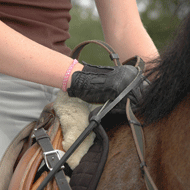New insights on rider weight and horse welfare

Researchers say the most likely reasons for the findings are rider weight as a proportion of horse weight, or rider position in the saddle or on the horse’s back.
A new study suggests that horses can experience temporary lameness and show signs indicating musculoskeletal pain when there is a high rider:horse bodyweight ratio.
The pilot study, published in the journal Equine Veterinary Education, explored the potential impact of rider weight on horse health and welfare.
Whilst it is widely recognised that inappropriate rider weight has welfare implications, there is a lack of reliable scientific evidence on which to base guidelines.
Six non-lame horses in regular work were ridden by four riders classified as ‘light’, ‘moderate’, ‘heavy’ and ‘very heavy’. A standardised, 30-minute ‘dressage test’ was undertaken by each horse-rider combination and abandoned if researchers observed lameness or behavioural markers of pain.
None of the tests were completed by the heavy or very heavy riders and one out of 12 tests involving medium riders was abandoned. Researchers say the most likely reasons for this are rider weight as a proportion of horse weight, or rider position in the saddle or on the horse’s back.
All horses trotted sound after the test was abandoned and completed the study, moving well when ridden.
Lead author Dr Sue Dyson, head of clinical orthopaedics at the Animal Health Trust, said: “The results indicate that every rider and especially heavier riders should ride a horse or pony of appropriate size and fitness for the rider’s weight, with a saddle that is correctly fitted for both horse and rider.”
Funding has been confirmed for the next phase of research, which will explore whether the horse’s fitness, adaptation to carry heavier weights or more ideal saddle fit, could increase the weight individual horses can carry.



 The latest
The latest